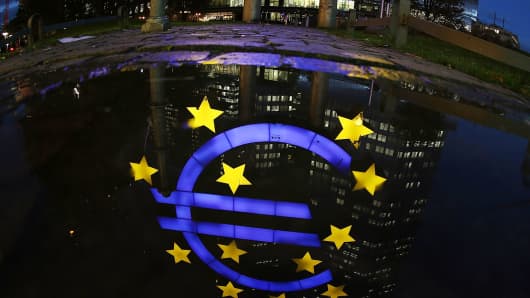Investors who braved dire warnings about existential threats to the euro area have been richly rewarded. Over the last twelve months, euro area equity prices soared more than 23 percent. That leaves liquidity turbo-charged U.S. and Japanese markets far behind.
The monetary union's bond market performance during the same interval is even more impressive, given the widespread forecasts of impending disasters on its southern periphery and a new round of financial distress. Here is what happened: Yield spreads with respect to the benchmark ten-year German bond were halved in the case of Italy and Greece, and more than halved for Spain and Portugal.
That is quite remarkable because the yield on the German benchmark bond declined over that period from 1.60 percent to 1.37 percent last Friday.
Read MoreDollar edges up, euro remains under pressure
Predictably, these large capital flows favoring euro area assets have kept the single currency's trade-weighted exchange rate stable on a mild upward trend.
Can these good euro fortunes continue? I believe that is possible.
"Stabilität" is a good word
Even the Chinese -- Germany's "dream team" partners -- like it. To say nothing of some latter day Mediterranean converts, who thought that Berlin's relentless preaching about the virtues of fiscal discipline and probity would pay off by building up investor confidence was a cruel "pie in the sky."
Read More'Wave of confidence' boosting euro zone: Trichet
The German hectoring, assorted with some wrenching arm-twisting, not only produced results, it slowly passed the disciplinarian's baton back to the markets. And that is where we are now: Markets are closely scrutinizing fiscal policies and budget outcomes in a way that no euro area government would again dare test their patience.
The German-led stability pact has also institutionalized euro area budget procedures. Each member country must submit its fiscal policies for review to the EU Commission before they are presented to the country's legislature. That is a serious dent in national sovereignty, but the scrutiny of the EU Commission, euro partners and financial markets has opened up a transparent process where any fiscal transgressions would entail exorbitant costs for public finances.
Read MoreSweden poses euro zone-style 'contagion risk':IMF
The monetary policy is in the hands of a supranational institution – the European Central Bank (ECB) – which has shown rigor and imagination in handling a hugely difficult task with limited authority in the context of an incredibly complicated legal and administrative environment.
The strength of the euro's trade-weighted value and the successful implementation of the ECB's key mandate – price stability defined as an inflation rate between 0 and 2 percent – are witnessing that the bank is doing a good job.
Slowly but surely, the ECB is also changing the euro area's political culture. By its statute, the central bank can never be a politician's hand-maiden, throwing unlimited amounts of money at any problem of electoral interest. There again, things are moving toward the German tradition where the monetary authority is a respected institution completely off limits to political fixes.
Read MoreLow inflation warnings 'irrational': Ex-ECB's Stark
Old habits are dying hard, though. Reading the European press I often see the nostalgia for the times when national central banks were under politicians' thumbs, doing what they were told to do. But even there, such attempts look more like the usual political game of blame shifting than an expectation that anyone would take seriously the central bank criticism.
Is euro deflation an "irrational" view?
The current IMF-inspired and promoted debate that not enough is being done to forestall the euro area "deflation" is a case in point.
The ECB has vehemently dismissed the idea of price deflation while emphasizing that it carefully monitors cost and price developments, and that it stands ready to do everything it can, within its mandate, to help the unfolding economic recovery.
True to form, Germans have been much more aggressive in squashing the deflation idea. One of the ECB's former German economists called the whole thing "irrational."





